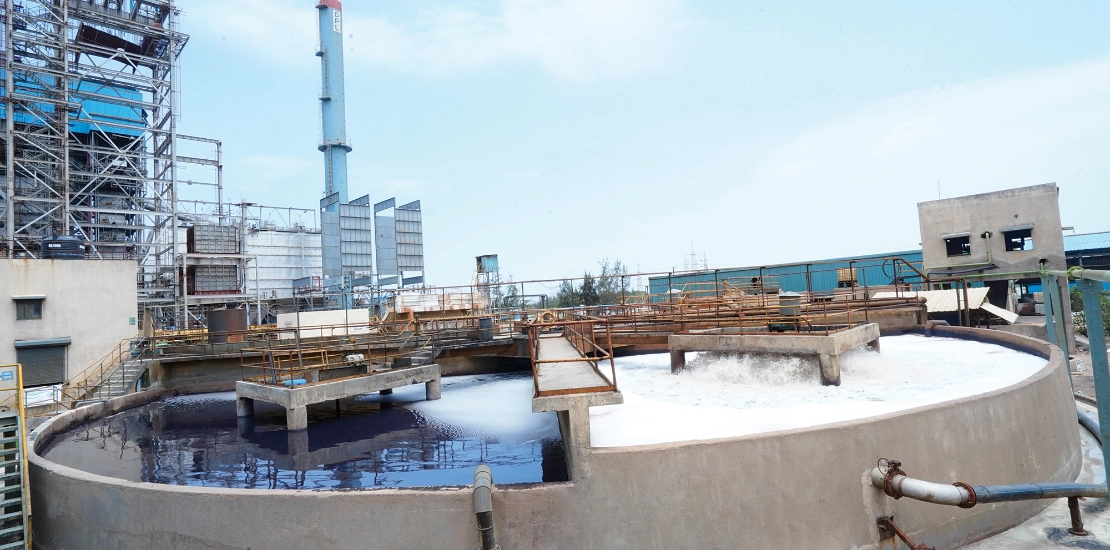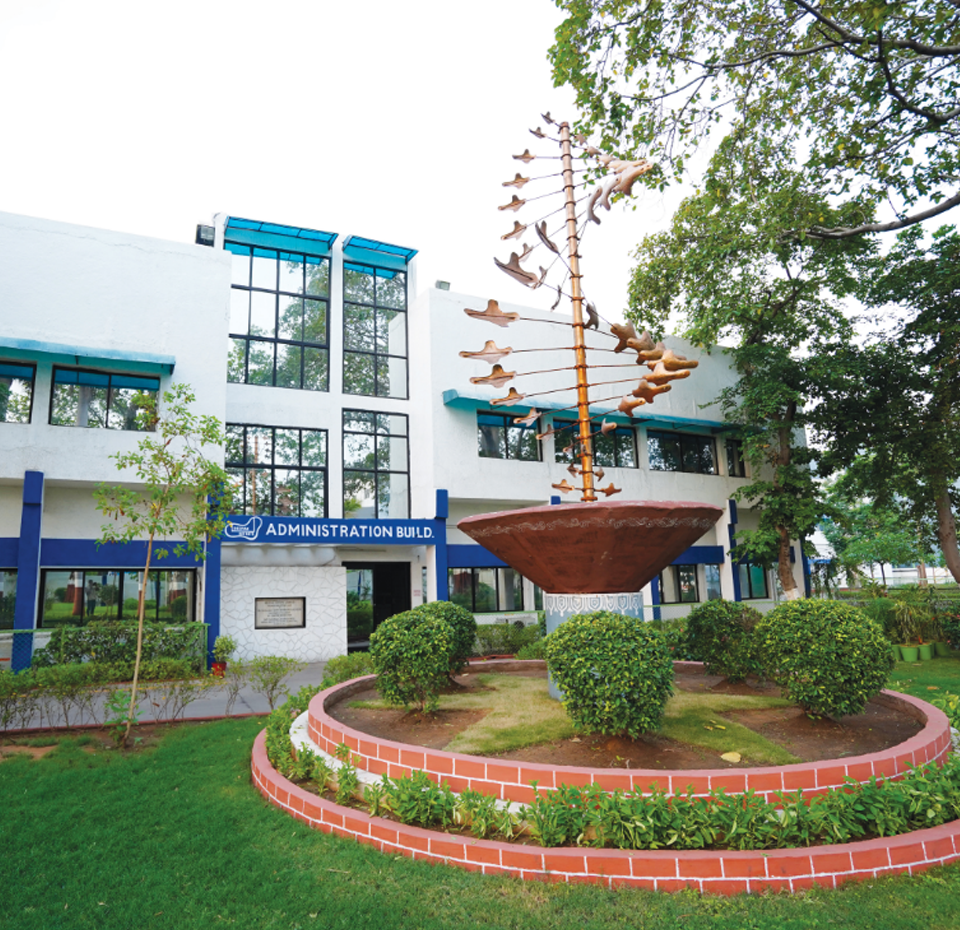Material Topics Linked
Climate Change & Emissions
Water Use & Effluent Management
Waste Management
Energy Management
Biodiversity
Product Stewardship
Key Risks Linked
Environment Norms
Compliances
Key Strategies Linked
Sustainable growth
UN SDGS impacted
KEY KPIs AND HIGHLIGHTS
14,71,670
MTCO2e Scope 1, 2 & 3 emissions
7,44,751 KL
Water recycled
80,000+
Trees planted
32,25,464 kwh
Energy savings through renewable energy
71,358 MT
Waste recycled
OUR APPROACH TO SUSTAINABLE DEVELOPMENT
Our approach to sustainability is anchored in globally accepted sustainability frameworks, including the Global Reporting Initiative (GRI), Sustainability Accounting Standards Board (SASB), and the United Nations Sustainable Development Goals (SDGs). Guided by these frameworks, we have implemented several initiatives specifically aimed at minimising our environmental footprint. Our core efforts focus on the systematic management of emissions, responsible water use, and sustainable waste practices.
Levers for Sustainable Development
- Sustained investments in cleaner and cost-efficient technologies
- Reduce carbon footprint
- Reduce, reuse and recover for resource conservation and sustainable growth
- Conserve natural resources
- Minimise discharge and disposal
ESG RATINGS FOR DEEPAK NITRITE
Responsible care logo holder company since 2012
62 score (Bronze medal)
“B” in Climate Change and Water Security
56/100 score
24.5 (Medium Risk); 117th rank out of 580 companies in the chemicals sector
EMISSIONS AND ENERGY MANAGEMENT
Deepak Nitrite focuses on reducing emissions by implementing energy conservation initiatives and technologies across our plants. We are undertaking a major overhaul in our energy mix to transition 60%-70% of energy consumption to renewable sources in Gujarat and Maharashtra. This shift will significantly lower our carbon emissions, aligning with our sustainability commitments.
Initiatives In FY 2024-25
- Installed Smart Power Optimiser Panel for energy conservation
- Replaced old motors with highly efficient IE3 motors
- Conducted loading and unloading of products and raw material in a closed loop, with its vent connected to vapour recovery unit (VRU)
- Installed solar rooftop for energy conservation
- Reduced steam norms in products
- Utilised green fuel (Biofuel) in the Boilers & Heaters
- Double mechanical seal in raw material and product transferring pumps to control the fugitive emissions
6.2%
Reduction in emission per tonne of production
21,76,266 MJ
renewable electricity sourced ~ 3.5 times of previous year
WATER MANAGEMENT
Our water efficiency efforts are aimed at reducing freshwater consumption through comprehensive water recovery, reuse and recycling. We are actively striving for water efficient operations, emphasizing the conscious and responsible use of this vital natural resource.
Initiatives In FY 2024-25
Integration of Scalban Technology in Cooling Towers
We have installed Scalban technology in our cooling towers, enabling us to send the R.O. reject streams directly to the cooling tower instead of the MEE. This has reduced our fresh raw water consumption and lowered the operational load on MEE treatment process.
Product Recovery And Reuse
We reuse the product recovered from the stripper top and stripper bottom in the specific production processes, leading to optimal resource use and reduction in our freshwater consumption.
Reverse Osmosis (R.O.) Permeate Reuse
We reuse the permeate from our R.O. system in the cooling tower, directly lowering our dependence on freshwater.
Condensate Recycling
We recycle and reuse the condensate from the Mechanical Vapor Recompression (MVR) and Multiple Effect Evaporator (MEE) systems, along with steam condensate, back into the facility operations.
Conservation of Non-Processed Water
We have reduced non-processed water use by implementing drip irrigation system for our greenbelt development, optimizing tap sizes, and installing dual-flush toilets.
5,000 KL
water saved through rainwater harvesting
7,44,751 KL
Water recycled
11.21%
reduction in treated wastewater discharge

CASE STUDY
INNOVATIVELY BOOSTING WATER EFFICIENCY
Background
Freshwater was used in the cooling tower, while the R.O. reject water was sent to the Multiple Effect Evaporator (MEE) for further treatment.
Intervention
We implemented advanced technology that now directly utilizes the R.O. reject water in the cooling tower instead of sending it to the MEE.
Impact
This innovation has significantly reduced the freshwater reliance and lowered the operational load on the MEE system, achieving a significant step in our water efficiency journey.
WASTE MANAGEMENT
We are committed to reducing our waste generation and disposal using innovative measures. Our approach embraces the 4R principles - reduce, reuse, recycle, and recover – effectively transforming waste into valuable resources within a circular economy framework.
Initiatives in FY 2024-25
- We are now using an alternate neutralizing media for primary treatment of wastewater, identified through a meticulous treatability study at our Research and Development Centre. This has led to a significant reduction in sludge volumes.
- We installed volute press to further reduce the waste quantity
- We have deployed effective recovery processes to divert waste material from landfilling to recycling.
22%
Reduction in total waste disposal
CASE STUDY
WASTEWATER REDUCTION IN OPERATIONS
Challenge
Historically, our primary wastewater treatment in operations relied on hydrated lime as a coagulant, leading to the following downstream issues:
- Increased hardness in the treated water
- Production of high sludge volumes
- Choking of the evaporation and filtration units
- Negative impact on overall operational efficiency
Our R&D Based Solution
The extensive research at our R&D centre a superior substitute for wastewater treatment, without compromising on the quality and cost. It also offers several other transformational benefits.
Impact
This resulted in significant advantages in terms of cost, efficiency, and environmental impact:
- 85% reduction in sludge volumes achieved due to lesser consumption
- Does not significantly increase hardness of treated water, ultimately enhancing performance of the filtration and evaporation technologies
- Reduced Scope 3 emissions leading to lower carbon footprint
- Lesser sludge production leads to reduced requirements for handling/storage and movement of waste
